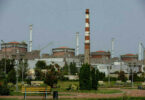Alex Webb
Dialog Semiconduc-tor Plc Chief Executive Officer Jalal Bagherli can finally breathe a sigh of relief.
Three years ago, his company appeared to be in free fall after it emerged that Apple Inc., its biggest customer, planned to develop its own power-management chips — the very component that Dialog supplied. On Monday, Japan’s Renesas Electronics Corp. agreed to acquire Dialog for 4.9 billion euros ($5.9 billion). That’s a 65% premium to the level at which the U.K. chipmaker was trading as recently as December.
In other words, Renesas is paying a steep price. To cover Dialog’s cost of capital within three years of the deal’s completion, it would likely need to find savings in the order of $600 million — about a third of Dialog’s total operating expenses. So far it’s identified just $125 million of synergies, according to Monday’s press release.
Instead, the Tokyo-based company seems to be gambling on its ability to boost sales of Dialog’s products by pumping them through its sales channels. Renesas gets most of its revenue from automotive and industrial applications, the same markets that Dialog is targeting as it seeks to reduce its dependence on Apple. It’s betting on the adoption of electric vehicles, since full EVs need as much as $834 of chips, more than double the requirement of vehicles with a combustion engine, competitor Infineon AG estimates. Of that, $330 is for power management, which is Dialog’s specialty. It produces chips that determine how to distribute power around a device.
Still, Renesas is taking a long-term view: It expects the combination to add $200 million to the merged companies’ sales in four to five years’ time.
That’s well short of the amount needed to justify the deal’s value. Electric drivetrain sales will really have to accelerate to warrant the price.
That Bagherli has got Dialog to this point is nonetheless remarkable. The shares lost almost half their value in the weeks after it was first reported in late 2017 that Apple, which then accounted for 75% of Dialog’s sales, was designing its own power-management chips. The company appeared doomed. It abandoned an attempt to diversify by acquiring $1.6 billion Synaptics Inc., a maker of touchpads, in 2018. Apple then agreed the same year to acquire much of the Dialog division whose products it claimed no longer to need. But that transaction came with a licensing and supply agreement, guaranteeing Dialog three years of income.
It’s important Bagherli tells investors whether that Apple licensing deal will be renewed (it’s set to expire next year) before they agree to tender their shares to Renesas. If it will indeed expire, it looks like he may have found them a soft landing. But if Apple extends the agreement, then Dialog investors may need to reevaluate the Renesas terms.
The threat of a stalking horse seems to have elicited a higher price for Dialog: Franco-Italian chipmaker ST Microelectronics NV also reportedly made an approach. And although the deal will face regulatory scrutiny, it’s hard to imagine the U.K.’s antitrust authority deeming power-management technology strategically important.
With the benchmark Philadelphia Stock Exchange Semiconductor Index trading at an all-time high, and the risk of impending higher interest rates threatening that boom, there’s surely no better time to sell. Bagherli has done well to strike a deal and cash his chips now.
Bloomberg






